Many residents have questions about waste and resources policy, waste separation and waste charges. This is understandable. That is why you will find answers to frequently asked questions about bulky household waste here.
Do you have another question? Ask us your question. We will do our best to answer your question to the best of our ability. And you help complete this list of frequently asked questions right away.
Many residents have questions about waste and raw materials policy, waste separation and waste charges. This is understandable. That is why you will find answers to frequently asked questions on supervision and enforcement here.
Do you have another question? Ask us your question. We will do our best to answer your question to the best of our ability. And you help complete this list of frequently asked questions right away.
Many residents have questions about waste and resources policy, waste separation and waste charges. This is understandable. That is why you will find answers to frequently asked questions about:
- Waste and resources policy
- Waste charges and recycling rate
- Separating waste
- Baby nappies and medical waste
- Containers
- Environment pass
- Bulky household waste
- Monitoring and enforcement
- Litter pass
Do you have another question? Ask us your question. We will do our best to answer your question to the best of our ability. And you help complete this list of frequently asked questions right away.
Awareness and behavioural change are the keywords to reduce the flow of residual waste. Since 2014, we have therefore offered the "Waste-Free Schools" programme. This programme teaches pupils that waste consists of valuable raw materials and gives them the knowledge to deal with it properly.
More and more schools want to make students aware that waste contains valuable resources, such as paper, plastic, food scraps and more. Sustainability is therefore increasingly high on the agenda. A good development. Especially since there should be no more residual waste in the Netherlands by 2050 and raw materials are constantly being reused. Fortunately, more and more pupils take a sustainable mug and lunch box with them. This saves mountains of disposable packets, sandwich bags and aluminium foil. Separate waste collection at school is obvious, but proves difficult in practice. That is where the "Waste-Free Schools" project can help.
Waste-free school
But what exactly is a waste-free school? A waste-free school is a school that goes for less waste. The waste that does eventually arise is properly separated. This means that the school has less and less residual waste Kortom, waste separation and waste prevention. In exchange for their efforts, schools do not have to pay for the separated waste collected by Waardlanden.
Some 80% of all regional schools in our region are now waste-free. When parents and carers see how enthusiastic their children are about separating waste and the importance of recycling, they are encouraged to take steps towards a more sustainable lifestyle at home too. Thus, the initiative at school becomes not only a learning moment for children, but also an opportunity to reach whole families and work together towards a circular future.
Educational and practical support
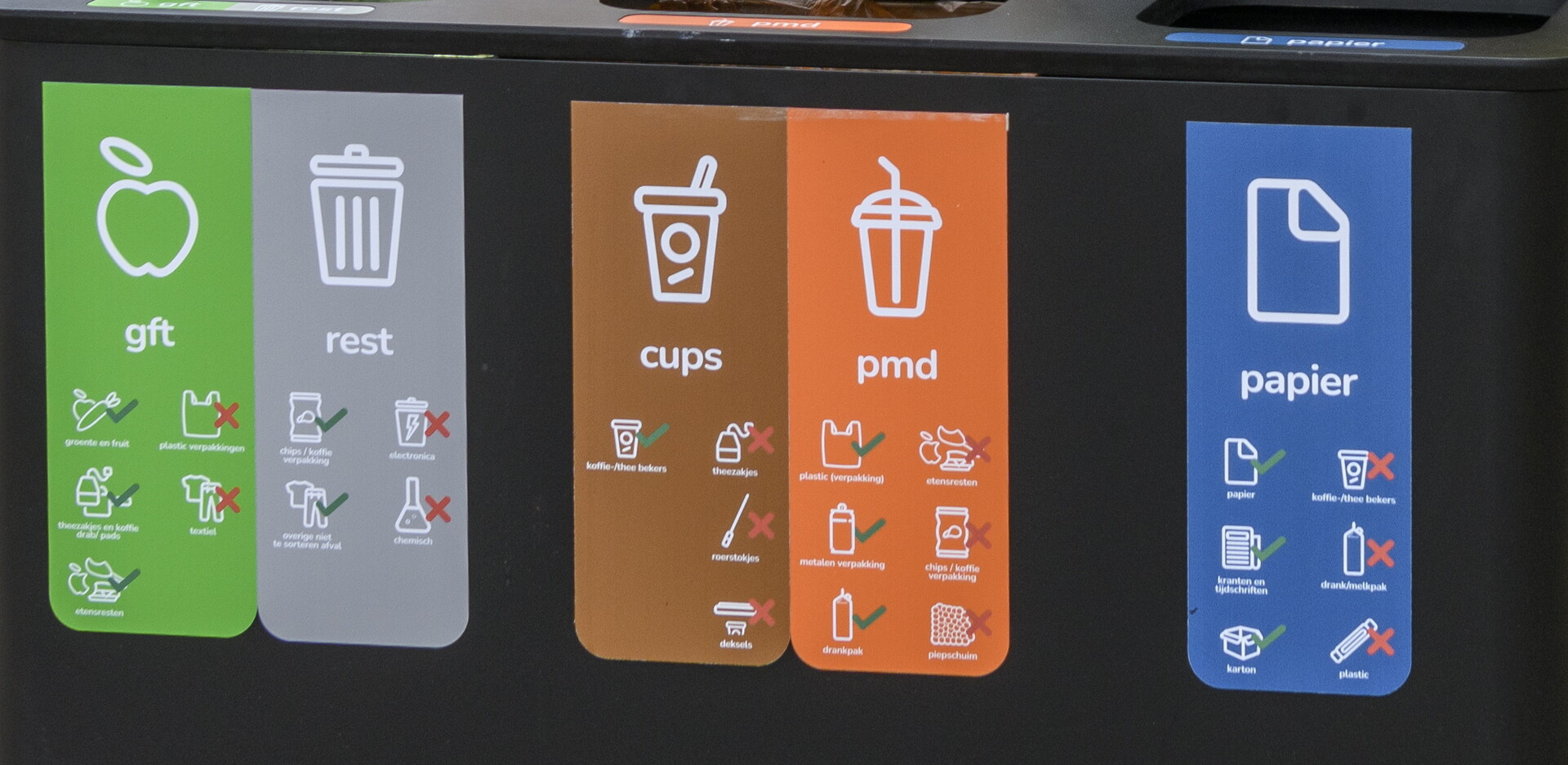 We provide materials, such as waste bins to separate the different raw material streams in the classroom, separation guides and grabbers. We also give guest lectures, organise excursions to an environmental centre, help with teaching programmes and monitor waste separation in primary schools. Together with Gorinchem Nature Centre (NCG) We provide environmental education at schools in the municipalities of Gorinchem, Hardinxveld-Giessendam and Molenlanden. In Vijfheerenlanden, we do so in cooperation with The Green Meadow.
We provide materials, such as waste bins to separate the different raw material streams in the classroom, separation guides and grabbers. We also give guest lectures, organise excursions to an environmental centre, help with teaching programmes and monitor waste separation in primary schools. Together with Gorinchem Nature Centre (NCG) We provide environmental education at schools in the municipalities of Gorinchem, Hardinxveld-Giessendam and Molenlanden. In Vijfheerenlanden, we do so in cooperation with The Green Meadow.
Secondary schools can also get tips, advice, and possibly guest lessons and tours from our education officer. If you are interested, please contact us by sending an e-mail to milieucoach@waardlanden.nl.
Teaching kits
To unburden primary schools as much as possible, Nature Centre Gorinchem and De Groene Weelde have developed ready-made teaching kits to work with in the classroom. Waste-free schools can book these free of charge.
A teaching box contains elaborated lessons and materials around a theme. This makes giving your own lesson very easy.
Questions about the teaching boxes of Natuurcentrum Gorinchem
Mail to educatie@natuurcentrumgorinchem.nl or call 0183-630911 on weekdays between 9am and 5pm.
Questions about De Groene Weelde's teaching kits?
Mail to info@groeneweeldevhl.nl
Guest lectures - excursions
Teaching about the circular economy is one thing, but seeing and experiencing it is two! Some lessons we can also teach at school or in the neighbourhood.
Guest lesson on waste separation
During this lesson, we discuss the different resource flows with the students. Themes will be discussed: buying less, the cycle, repairing, the environmental street, the danger of litter and why separating waste is so important. What belongs in which bin and what can we make with properly separated raw materials? We end the lesson with a fun quiz and hand out up-to-date separation guides. After the lesson, pupils will know all about reducing and properly separating waste and will be able to separate school waste correctly. Because a lot is changing in the world of waste, the lessons are not only interesting for pupils, but teachers also learn a lot from them.
The lesson lasts 25 minutes per class. Groups 1 to 8 may all be scheduled on one day. The education officer then takes turns visiting a class.
Want to know more? Contact Nelleke Gouw or Ingrid Lopulalan and send an email to milieucoach@waardlanden.nl.
Visit educational trail Ecopark
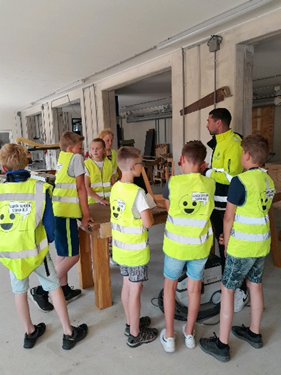
During this lesson, we give the group a tour of the Ecopark in Groot-Ammers. The pupils take a look at workshop De Gezel, and 2nd chance building materials. This is followed by an interactive lesson in the Ecopark's education room, where small groups make assignments about waste and valuable raw materials. Themes covered include textiles, smartphones, electronic devices, batteries and litter. Activities such as 'electronic devices bingo' and 'litter on the clothesline' make the lessons interactive. Pupils thus playfully discover how long nature takes to break down different types of waste. Finally, themes such as sustainability and consumerism are discussed with the group.
Partner De Gezel made the furniture for the education room from discarded materials, such as bar stools made from old bicycle tyres and tables made from old wood.
The tour and lesson lasts a total of 1.5 to 2 hours and is free for Waste Free Schools.
Is your class also coming to take a look at the Ecopark?
The tour is not only suitable for primary schools, but also connects very well with secondary schools.
> Want to know more about the possibilities or make an appointment? Send an e-mail to team Education
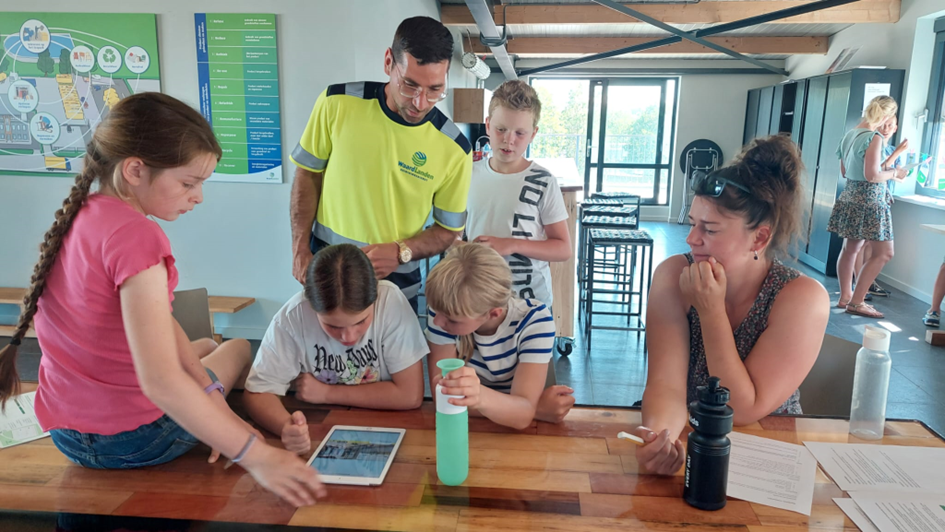
Engineering classes in collaboration with The Gezel and SitY Academy
To introduce primary school pupils to engineering, crafts and professions in the circular economy, we offer on-site classes in cooperation with The Gezel and SitY Academy.
During these lessons, students will be prepared for the circular economy of the future, where repair is central.
Clean-up campaigns against litter
Clean-up campaigns are fun to do. You get to work outside while keeping our environment clean and beautiful. We are therefore happy to help schools that want to organise clean-up actions with the necessary equipment and tips. We supply:
- Safety vests
- Rubbish bags
- Prickers
- Gloves
Afterwards, we will come by with one of our collection trucks and dispose of the bags of litter.
> Picking up litter with your school? Send an e-mail to team Education
Become a Waste Free School too?
Does your school also want to become litter-free or would you like more information first? Fantastic! Team Education would love to get in touch with you.
Waardlanden handles waste and raw materials collection for the municipalities of Gorinchem, Hardinxveld-Giessendam, Molenlanden and Vijfheerenlanden.
As a resident, you can offer your waste and raw materials in a container at home or in a collection container in the neighbourhood, at one of the environmental centres or have it collected. You may still be able to get broken, discarded and reusable products repaired at a repair shop or bring to the Circle Square or a thrift shop. They then get a second life and do not become waste. In this way, together we ensure that waste and raw materials are reused as much as possible. This is good for the environment and your wallet.
Offering waste and raw materials
Containers for household waste and raw materials
We collect your vegetable, fruit and garden waste and food waste (VGF), plastic packaging, metal packaging (cans) and drink cartons (pmd), glass, paper, textiles and residual waste using containers. How you can dispose of your waste and raw materials depends on where you live.
> Find out how to offer your waste and raw materials
Waste recycling points for other waste and raw materials
All other waste streams can be offered at one of the environmental centres.
Have waste and raw materials collected
You can have your bulky household waste, metal, waste electrical and electronic equipment (e-waste) and bulky garden and pruning waste collected.
Contact
Do you have a question about our services? Contact us or leave a message using the contact form. We will be happy to help you!
Waardlanden
Postal address
PO Box 555
4200 AN Gorinchem
Visiting address
Boezem 3 (Papland industrial estate)
4206 CA Gorinchem
Opening hours
Monday to Friday from 8:30 a.m. to 5 p.m.
> Consult the opening hours of our waste disposal points
Keeping up?
Stay updated and receive tips on how to reduce waste and separate even better? Subscribe to our newsletter.
Contact form
Directions
- On the A15, take exit 28-Arkel.
- At the end of the exit, turn towards Arkel (Spijksesteeg).
- Follow the signs for Papland.
- At the roundabout, take the second exit.
- Turn left following the curve onto Zuiderlingedijk.
- Follow the Zuiderlingedijk to the T-junction (after about 1.4 km).
- Turn left onto Arkelsedijk.
- After 140 metres, take the first exit on the roundabout (Keerring).
- You are driving on the Papland.
- At the T-junction, turn left onto the Boezem.
- You will find your destination on the right: Waardlanden, Boezem 3.
Do you ever doubt which bin a product or material belongs in? The separation guide on this page will help!
Residents of flats, upstairs flats and houses without three types of resource containers have been allowed to dispose of plastic packaging, metal packaging and drink cartons (pmd) in a neighbourhood residual waste collection container since the introduction of the environmental card. This waste is collected separately and later sorted by machines. As a result, we can recycle more and need to incinerate less residual waste. Residents of low-rise houses with a pmd container do separate pmd at home.
Always the separation guide at hand
With the handy Waardlanden app, you always have the separation guide to hand. You can download the Waardlanden app onto your smartphone yourself. This way you will always have all information on waste and raw materials to hand. You will also find your personal waste calendar in the app. And you can quickly and easily file reports, make a bulky waste appointment and order bags. Download the app here!
Do you prefer a paper separation guide?
You can view, download and possibly print the waste separation guide. You can hang it up in a handy place at home. That way you can quickly see what belongs where.
- Download the handy waste separation guide in Dutch
- Download the handy waste sorting guide in Arabic
- Download the handy waste sorting guide in English
- Download the handy waste sorting guide in Ukrainian
- Download the handy waste sorting guide in Polish
- Download the handy waste sorting guide in Romanian
- Download the handy waste sorting guide in Spanish
- Download the handy waste sorting guide in Turkish
Everything in the right container. For the reuse of materials as raw materials, it is important that no contamination is added. Then the quality of the material remains as good as possible and it can be recycled. For this reason, many materials are collected separately, separated from residual waste. The main rule for separation at home is: clean and/or dry.
- Only vegetable, fruit and other food waste and garden waste may be put in the GFT container.
- Only glass bottles and jars are allowed in the glass container (packaging glass).
- Only clean and dry paper and cardboard may be put in the paper container.
- Only (empty) plastic and metal (cans) packaging and beverage cartons are allowed in the pmd.
- Only textiles are allowed in the textile container.
This sounds logical, but a lot of contamination is still found in the containers for these material streams. Plastic in the waste paper or GFT, for example, is very bad for the environment. By separating neatly, the sorting and recycling process runs efficiently. Little pollution then needs to be removed from the material stream before the material can be used again as a secondary raw material in a production process. And sorting costs remain limited, so separate collection also remains financially worthwhile. Because VGF, PMD and paper contaminated with, for instance, plastic or residual waste cannot be recycled for reuse. As a resident, you then pay for processing as waste but do not get any yield from the raw materials. Those who do not separate or separate badly are therefore driving up costs for themselves and their neighbours.
By separating waste properly and cleanly, we together - residents, municipalities and Waardlanden - keep waste processing costs manageable. And we work together towards a beautiful, valuable living environment.
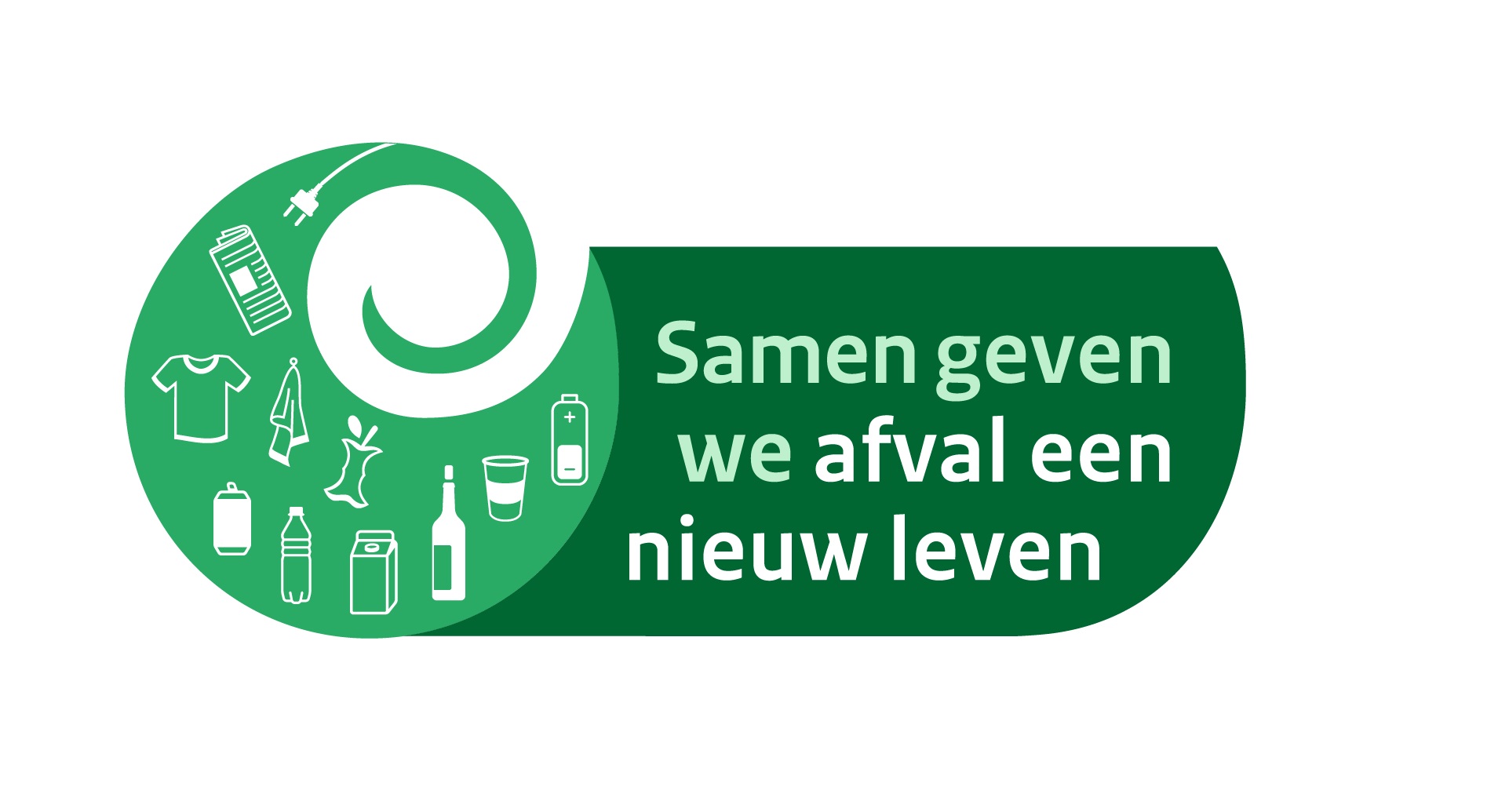
By separating waste, we keep less residual waste. Thus, we make the waste mountain smaller. That is better for the environment. We recover valuable raw materials for reuse. They are not incinerated with residual waste. The separated raw materials are used to make new products and materials.
Separating waste saves costs
Separating waste also provides financial savings: materials such as organic waste, glass, paper, textiles and metal are valuable. For example, we turn vegetable, fruit and garden (VGF) waste and food waste into compost, and it produces biogas (green gas) and heat. Recycling and reuse is less expensive than incineration. Burning these valuable raw materials together with residual waste is not only bad for the environment, it also costs more money.
Separated waste stays separated
Everything you hand in separately in containers and at the waste disposal site remains separated. The collected materials are reused wherever possible. For example, old glass becomes new glass, old paper becomes new paper and VGF waste becomes compost. This provides many environmental benefits. And recycling keeps the costs of waste collection and processing manageable.
You sometimes hear: 'Everything goes back into one pile anyway'. This is incorrect. Our trucks collect the same raw material each time. Only if collected material is badly separated, it cannot always be recycled properly. If there is too much residual waste with the VGF, paper or PMD, for example, then unfortunately it still has to go with the residual waste and is incinerated. That is very unfortunate because raw materials are lost. Less residual waste is important for the environment and for your wallet.
Test your knowledge with the Waste Separation Quiz
Styrofoam, an empty pizza box or a broken drinking glass. Do you know what belongs in which bin? Take the quiz and find out what you already know about waste separation. At the end of the quiz, you will receive tailored advice to increase your knowledge.
Subscribe to our newsletter
Stay informed about the latest developments and receive useful tips on how to separate less waste and even better? Sign up to receive the monthly digital 'Lekker opgeruimd' newsletter.
Yes, I want to receive the newsletter
What about waste charges?
The waste collection charge is a pass-through of the costs incurred by Waardlanden and the municipalities to collect and process waste. Waardlanden and the municipalities do their utmost to keep the costs of collection and processing manageable. Nevertheless, the costs are rising.
> Find out why here
Separating waste for recycling is something we do together
Together with you and the municipalities, we are committed to a circular society and economy. Where discarded products and materials do not go to waste by being thrown away and incinerated. And where we reuse as much as possible. In this way, we preserve valuable raw materials. And prevent waste. Many people are already aware of this and separate their waste. That is a good thing!
We help where we can by placing and emptying containers where you can separate your waste. And we transport collected waste and materials to specialised treatment plants for recycling. Of course, you can also come to us with questions about reducing waste and separating it even better.
> Meet our environmental coaches, they will be happy to help you with tips and advice


- Intro text: The wind is very strong. This causes problems in waste collection. Your container may not be emptied today.
The wind is very strong today. This causes problems in waste collection. This is because due to the strong wind, containers can quickly blow over. Your container may not be emptied today or we may not be able to empty underground collection containers.
Has your container not been emptied? If so, you can report it here.
To avoid unsafe situations as well as nuisance caused by blown away litter, please remove your container from the public highway as soon as possible after emptying. Also try to clear up any litter immediately. Together, we can keep the neighbourhood safe and clean.
Do not put rubbish near collection containers
Our drivers may not be able to empty the collection containers due to high winds. Is the collection container full? Please take your waste back home and try again later. We will try to empty any containers not emptied as soon as possible after the storm.
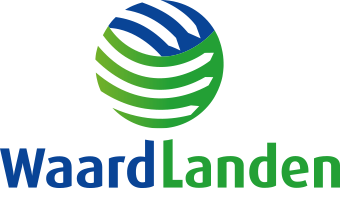
Waardlanden handles the collection of household waste and raw materials for the municipalities of Gorinchem, Hardinxveld-Giessendam, Molenlanden and Vijfheerenlanden.
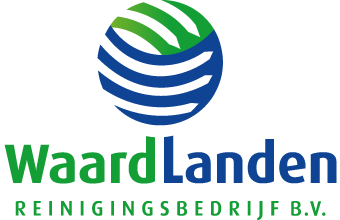
Waardlanden Cleansing Company provides services for collection, processing of industrial waste, slipperiness control and sweeping of industrial sites.








